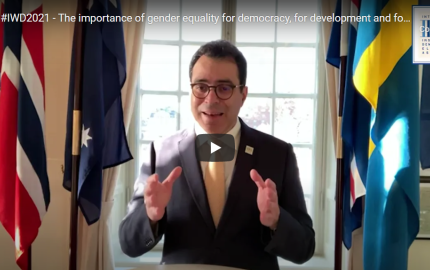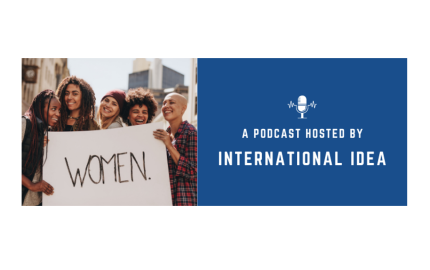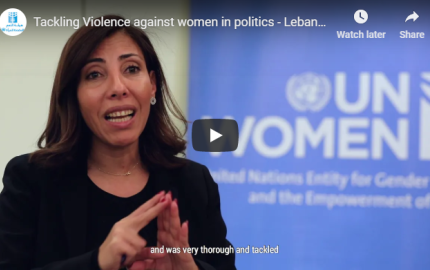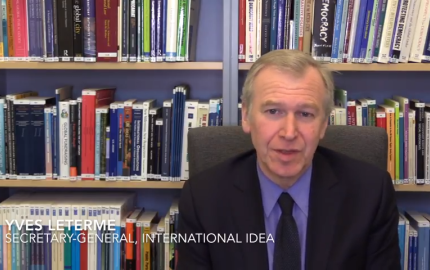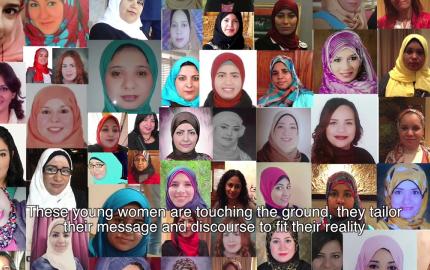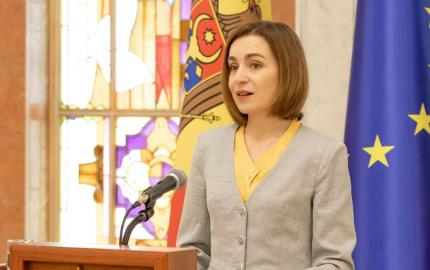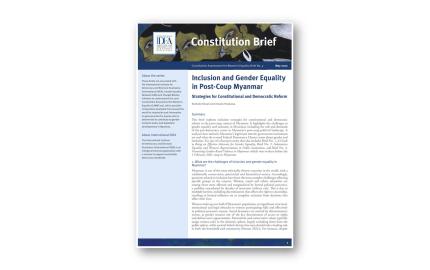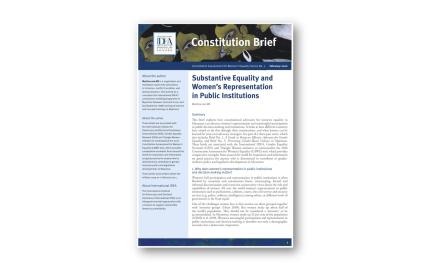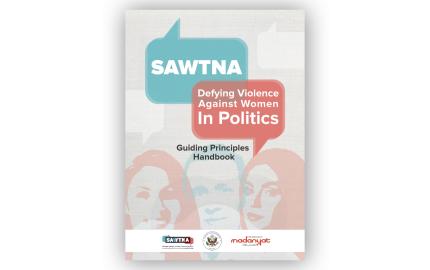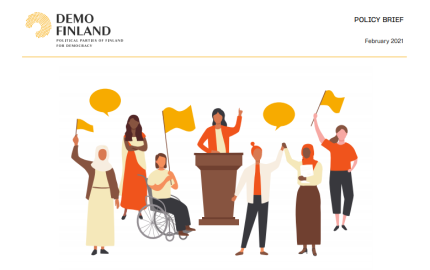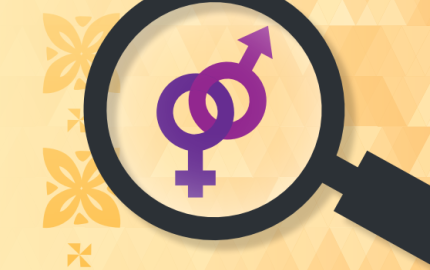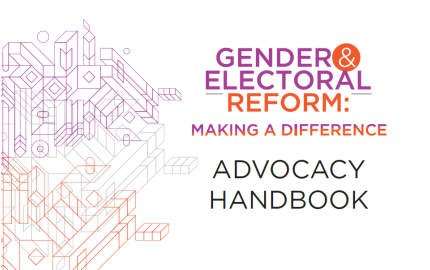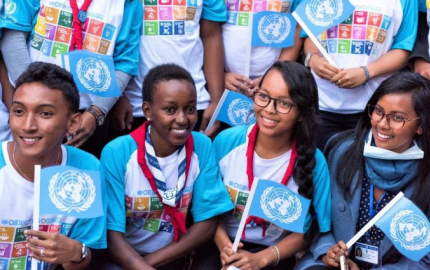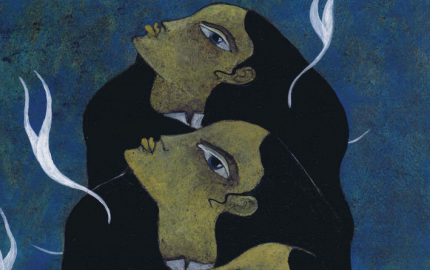Advocacy & Lobbying
Main navigation
"Contributing to society on equal terms, with equal opportunities in theory and practice every day. That’s what democracy is all about."
Dr Kevin Casas-Zamora, Secretary-General of International IDEA shares a message for International Women’s Day.
Across the world, women face challenges to participate in politics, from confronting hate speech to internal party obstacles and lack of subsidized maternity leave. What are the best ways to increase women’s participation in elections and within party politics? What has been the influence of the #MeToo movement? Is it just about increasing the numbers of women in parliament?
International IDEA’s Head of Global Programs Laura Thornton talks to Birgitta Ohlsson, Sweden’s former EU and Democracy Minister and currently head of National Democratic Institute's program for political parties in Washington.
GUESTS: Birgitta Ohlsson, Sweden’s former EU and Democracy Minister and currently head of National Democratic Institute's program for political parties in Washington
Click here to access the podcast.
Violence against women in politics is a serious violation of human rights and an obstacle to gender equality. Watch this video by UN Women Lebanon. Supported by the Government of Japan.
Sebretary General of International IDEA Yves Leterme discusses why we should commemorate and celebrate International Women's Day.
Watch this documentary film about the Women’s Voices Project which is implemented by the Egyptian Center for Women’s Rights with the support of the Fund for Gender Equality of UN Women.
Women for Election is a non-partisan, not-for-profit organisation whose vision is of an Ireland with balanced participation of women and men in political life. The organisation’s mission is to inspire and equip women to succeed in politics. Women are held back from entering politics for many reasons including the 5 C's - Cash, Candidate Selection, Culture, Childcare and Confidence. By training women to enter public life, Women for Election gives them the confidence they need to succeed on their political path. The organization is raising money to train 300 women ahead of the 2019 local elections This campaign is co-ordinated with minimal budget by a volunteer team.
Click here to learn more.
This paper examines the barriers that still inhibit women’s political participation in Georgia, Moldova, and Ukraine. It explains the main roots of women’s underrepresentation, first looking at public attitudes in the three countries regarding the efficiency of women politicians and the male-dominated political environment. Based on interviews with women politicians in the three countries, the research focuses on the use of gender quotas for participation in elections at the national and local levels. It describes the path to introducing gender quotas and explores the factors that determine the limits of their effectiveness. The paper then looks at other instruments for mainstreaming gender-balanced policies and their enduring limitations.
The paper offers recommendations for domestic and external actors—including lawmakers, political parties, the media, and foreign donors—on possible ways to enhance women’s participation with policy approaches concerning female leadership and gender-balanced decision-making.
Click here to access the policy paper.
This brief explores inclusion strategies for constitutional and democratic reform in the post-coup context of Myanmar. It highlights the challenges to gender equality and inclusion in Myanmar, including the role and demands of the pro-democracy actors in Myanmar’s post-coup political landscape. It analyses how inclusive Myanmar’s legitimate interim government institutions are and what the revised Federal Democracy Charter states about gender and inclusion.
It is one of a four-part series that also includes Brief No. 1. A Guide to Being an Effective Advocate for Gender Equality, Brief No. 2. Substantive Equality and Women’s Representation in Public Institutions, and Brief No. 3. Preventing Gender-Based Violence in Myanmar, which were written before the 1 February 2021 coup in Myanmar.
Click here to access the paper.
This brief explores how constitutional advocates for women’s equality in Myanmar can advance women’s representation and meaningful participation in public decision-making and institutions. It looks at how different countries have aimed to do this through their constitutions, and what lessons can be learned for your own advocacy strategies.
It is part of a four-part series, which also includes Brief No. 1. A Guide to Being an Effective Advocate for Gender Equality, and Brief No. 3 Preventing Gender-Based Violence in Myanmar and Brief No. 4. Inclusion and Gender Equality in Post-Coup Myanmar.
Click here to access the report.
The massive participation of women in the protest movements during the October 17, 2019 revolution and the way they took charge of handling the Covid-19 pandemic where women’s concerns were brought to the forefront, could give the false impression that the battle for their participation in politics has been won. Unfortunately, this is not the case. It seems that the old discriminatory mechanisms related to access to power persist and the increasing visibility of women in the public sphere comes at a high cost where they run the risk of becoming targets. With the rise in verbal and physical violence against women in the public life, something had to be done. In November 2020, Madanyat, with the support of the Public Affairs Section at the U.S. Embassy in Beirut, launched the program Sawtna defying violence against women in politics, which this publication is part of, to specifically address harassment on social and traditional media targeting women politicians, activists, and journalists.
Click here to access the full report published by Madanyat.
Strengthening Women’s Political Participation (2021) provides an overview of the political participation of women and reasons for their underrepresentation in politics. It includes recommendations for donors, national governments and political parties on how to strengthen women’s participation in politics.
Click here to see the policy brief published by Demo Finland on 1 March 2021.
Gender is a critical dimension of parliamentary scrutiny. Considering laws, policies, programmes and budgets from a gender perspective ensures that they are fair to both men and women.
This leads to better decision-making for everyone. This UNDP practical guide is for Members of the Fiji Parliament on how to scrutinise legislation from a gender perspective, in the day-to-day work of a parliamentarian. It is not an academic or theoretical description of the concepts of gender, equality or analysis but is designed to be a practical document.
While the toolkit specifically focuses on the scrutiny of legislation, the ideas can be applied to the scrutiny of policies and programmes too.
Click here to access the report.
The World Economic Forum predicts that the gender gap will not close entirely until 2186. At 106 out of 144 countries, Malaysia’s 2016 Global Gender Gap Index indicates that the biggest inequalities exist in terms of women’s political empowerment. In continuity of National Conference on Gender & Electoral Reform: Making A Difference – a groundbreaking public conversation on women’s representation in elected office held in August 2016, this advocacy handbook is part of the effort to raise awareness and advocate for gender & electoral reform within Malaysia.
Click here to access the handbook.
The 2030 Agenda for Sustainable Development, adopted in 2015, is the international community’s ambitious response to today’s most pressing global development challenges and will guide our development priorities for an entire generation. Young people played a key role in shaping this agenda and experience first-hand many of the issues it seeks to address.
Recent decades have witnessed significant advances in terms of human development, but deep challenges remain. Progress has been uneven, with many young people across the globe still experiencing interlocked forms of discrimination, limited political inclusion, high levels of poverty, and limited access to health systems, educational opportunities and decent jobs.
The goals and targets of the 2030 Agenda are interconnected, aiming to integrate the three dimensions of sustainable development: economic, social and environmental. Explicitly or implicitly, young people are deeply embedded within their fabric. Their knowledge, reach and innovative solutions are essential if sustainable development is to be realized.
The story of women’s political empowerment in the Pacific continues to be one of struggle and hardship. Commitments have been made by Pacific Leaders to facilitate women’s entry into politics. While some countries have translated these commitments into tangible actions, many have not. This publication aims to showcase the success stories, and the lessons learned along the way in implementing Temporary Special Measures (TSMs) in the Pacific, so that where the path is still to be travelled, it may benefit from those who have gone before. This publication mirrors the high quality discussions of the Pacific Regional Conference on TSMs, held in Port Moresby in November 2015. This conference was a joint initiative of UNDP, the Pacific Islands Forum Secretariat and UN Women’s Multi-Country Office in Fiji, with the financial support of the Australian Aid program.
Click here to access the publication.
The constitution-building process provides an extraordinary opportunity for women and gender-equality advocates to participate in the framing of democratic institutions. The Constitution Assessment for Women’s Equality helps users analyse a constitution or draft constitution from the perspective of the substantive equality of women. Using a series of questions, short explanations and example provisions from constitutions around the world, the Assessment guides you through an examination of the most critical constitutional issues that affect women’s rights and gender equality.
This Assessment is designed for gender-equality advocates as well as those who are engaging in the topic of women’s constitutional rights for the first time, whether as members of a constituent assembly, constitutional drafters, civil society members or concerned individuals. Since gender equality affects the quality of democracy and society as a whole, the Assessment is a resource for both men and women.
Click here to access the guide.
